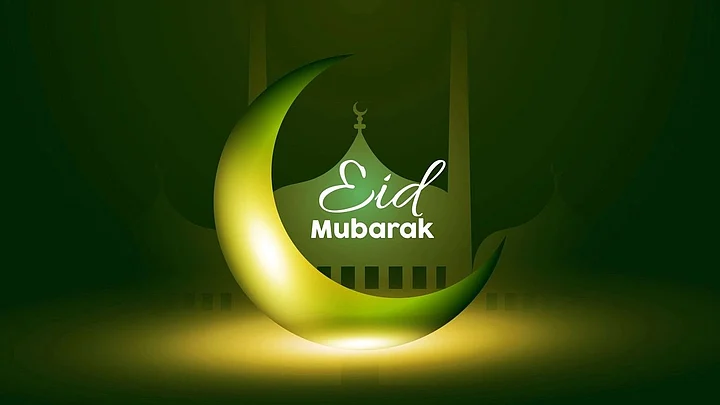Eid-ul-Adha 2024 Date in India: Eid-ul-Adha is the second major Islamic festival that is celebrated by Muslims all over the world. After Eid al-Fitr, which marks the end of Ramadan, this festival brings people together in a spirit of unity and devotion. Eid-al-Adha falls in the month of Dhul Hijjah of the Islamic lunar calendar.
The dates of all the Muslim festivals are determined after moon sighting. Many countries including Saudi Arabia, UAE, Qatar, Kuwait, Oman, and others will observe Eid-ul-Adha on 16 June 2024 while as in India, Pakistan, Malaysia, and Indonesia, Bakrid will be celebrated on 17 June 2024.
Eid-ul-Adha is recognized on the 10th day of Dhul Hijjah, and its dates vary every year. It commemorates the obedience, willingness, and devotion of Prophet Ibrahim towards Allah. On this occasion, Muslims gather together and celebrate the festival with grandeur and enthusiasm. Let us read about the Eid-al-Adha 2024 date, history, significance, rituals, and other details below.
Eid-ul-Adha 2024 Date
After Dhul Hijjah moon was sighted in many parts of the world, Eid-ul-Adha will be celebrated accordingly. In India, Eid-ul-Adha will be observed on 17 June 2024 while as in UAE and other Arab countries, Bakrid will be recognized on 16 June 2024.
History of Eid-ul-Adha
The history of Eid al-Adha dates back to the era of Prophet Ibrahim. According to the Holy Quran, Prophet Ibrahim had a dream in which Allah commanded him to sacrifice his son Ismail to prove his love and devotion towards the almighty. Without any hesitation, Prophet Ibrahim decided to follow Allah's command, and before he could sacrifice his son, Allah provided a lamb to sacrifice instead. After the lamb was sacrificed, Prophet Ibrahim was happy and satisfied and realized that it was just a test from Allah, which he had successfully passed. Since then, Muslims have been performing animal sacrifices on Eid al-Adha, and this is the reason Eid-ul-Adha festival is also called Bakra Eid.
Significance of Eid-ul-Adha
Eid ul Adha is a time of great joy and celebration for Muslims all over the world. The festival, which falls annually in the month of Dhul Hijjah , is a time for families to come together and celebrate with friends and family. It's a time to exchange gifts, visit one another, and share traditional dishes and desserts.
Eid ul Adha is also a time for Muslims to reflect on their faith and renew their commitment to Allah. It's a time to make sacrifices, remember Prophet Ibrahim's willingness to sacrifice his son for Allah, and reflect on the importance of charity and helping others.
Eid al Adha also has a strong focus on social unity and community. It's a time for Muslims to come together and strengthen their bonds of friendship and kinship. Eid ul Adha is a time for celebration, reflection, and renewal. It's a time to show gratitude for Allah, remember Prophet Ibrahim, and reflect on the importance of charity and service to others.
Eid-ul-Adha Rituals
Eid al-Adha is one of the most important festivals among Muslims. It commemorates the willingness of Prophet Ibrahim to sacrifice his son for Allah. This festivals has a great spiritual significance and is marked with a variety of rituals and traditions, some of them include the following.
Waking up early in the morning.
Taking a bath and dressing up in neat and clean clothes.
Offering Eid al Adha prayer as per the timing decided by the locals. It is also a time to perform the Takbir, which is the recitation of a declaration of the greatness of God. The Takbir is an important part of the this festival, and it is a time to reflect on the story of Ibrahim and his son.
Sacrificing an animal, usually a goat, sheep, cow, or camel. The sacrifice is a powerful symbol of Ibrahim's devotion and obedience to God. The meat from the sacrifice is divided into three parts, with one-third going to the family, one-third to relatives and friends, and one-third to the poor.
Spending family time together and sharing delicious meals. The celebration often include traditional sweets and savory items.
Paying extra charity to those in need. Muslims are encouraged to practice social responsibility and give back to their community.
(Disclaimer: Parts of this article were generated by AI and published after the content was editorially modified and verified by a human based on their own judgement and expertise. The Quint does not publish AI-generated content without direct human involvement and oversight).
(At The Quint, we question everything. Play an active role in shaping our journalism by becoming a member today.)
